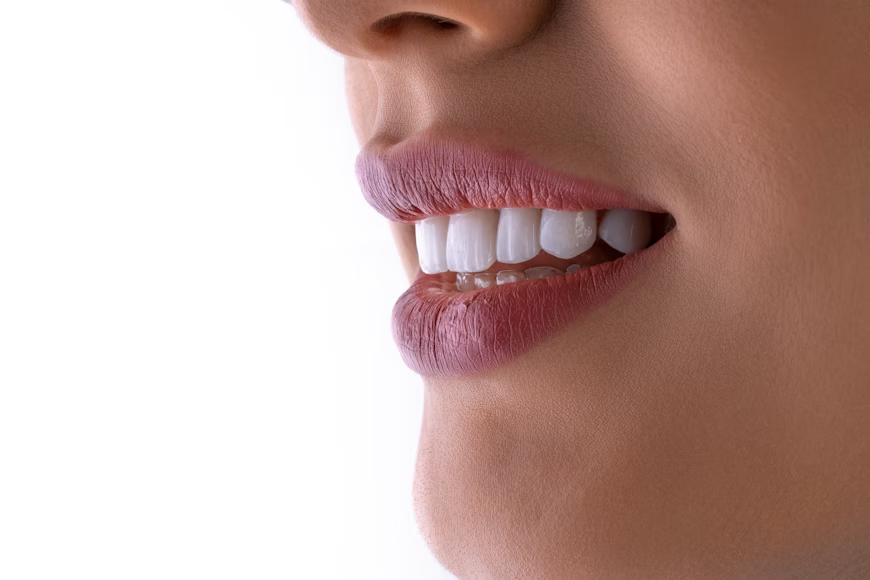
Few things hit the spot like an ice-cold drink on a hot day or a piping mug of coffee on a chilly morning. But that pleasure disappears the moment a sharp jolt shoots through your teeth. Just like that, a simple treat turns into something you have to suffer through.
That’s tooth sensitivity. Also called dentin hypersensitivity, it happens when the protective enamel on your teeth wears down or your gums recede, exposing the nerves in the dentin underneath. This makes your teeth more reactive to heat, cold, acidity, sweetness, and even air pressure.
Studies show that as many as one in two adults will experience sensitivity at some point, most often between the ages of 20 and 40. But while it’s pretty common, it’s not something you have to just put up with.
With the right habits and oral care, you can enjoy life’s little pleasures without the sting.
What Causes Tooth Sensitivity?
Your teeth don’t usually become sensitive out of nowhere. It’s often the result of wear and tear on the protective layers of your teeth. Enamel erosion is a leading cause. Acidic foods and drinks, citrus fruits, soda, candy, and some vinegars slowly chip away at your enamel. Brushing too hard or using a toothbrush with hard bristles can also cause this.
Another major factor is receding gums. This happens for a variety of reasons, such as brushing too hard, grinding or clenching your teeth (which dentists call bruxism), smoking and vaping, or even just your genetics. When your gums recede, it leaves your teeth more vulnerable to decay and other oral health problems if you don’t address it.
Finally, be careful with harsh mouthwashes that contain alcohol or strong astringents and certain teeth whitening products. These also contribute to sensitivity.
How to Prevent Sensitivity Before It Starts
Your dentist has likely given you this advice over and over. That’s because good oral care is pretty consistent. Sticking to the right habits will protect your enamel and gums before any discomfort starts.
- Use Enamel-Safe Toothpaste
Let’s start with your toothpaste. Some conventional formulas contain harsh ingredients that gradually wear away enamel. For instance, many toothpastes and whitening strips use hydrogen peroxide, which can increase sensitivity by penetrating enamel and irritating the nerves in your dentin.
Instead, opt for a gentle, enamel-safe option like a naturally derived toothpaste. If you do whiten your teeth, make sure to follow professional guidance and allow your teeth ample recovery time.
- Switch to a Soft-Bristled Toothbrush
Pair your gentle toothpaste with a soft-bristled toothbrush and a light touch. Think of it like you’re polishing a grape, not scrubbing tile grout. Brushing too aggressively erodes enamel and irritates your gums, which will only speed up sensitivity.
- Choose Alcohol-Free Mouthwash
Next, take a look at your rinse. Many over-the-counter mouthwashes contain alcohol and other harsh ingredients that dry out your mouth.
Contrary to popular belief, that burning sensation doesn’t mean it’s working better. You need a natural, alcohol-free mouthwash that supports a healthy oral microbiome rather than completely eliminating it.
- Avoid Brushing Your Teeth Immediately After Meals
Did you know that brushing your teeth right after eating can actually be bad for your enamel, especially after you’ve had something sugary and acidic like soda?
This is because the pH level in your mouth temporarily drops when you eat or drink, making your tooth enamel softer and more vulnerable to erosion.
Instead, dentists recommend brushing either before you eat or waiting at least 30 to 60 minutes after. This waiting period gives your saliva a chance to neutralize the acids in your mouth and remineralize your enamel.
Remember, what you eat matters. Limiting acidic and sugary foods and rinsing with water after is a simple way to keep your smile resilient.
Natural Fixes You Can Try at Home
Fortunately, tooth sensitivity doesn’t always require a trip to the pharmacy. There are effective solutions that are gentle, natural, and backed by science.
For example, consider using a toothpaste with hydroxyapatite, a mineral that makes up 97% of your tooth enamel. It not only helps rebuild weakened enamel but also seals off tiny holes that expose the nerves, reducing sensitivity over time.
Xylitol, a natural sweetener found in many chewing gums and oral care products, is another great option. It helps balance your mouth’s pH and stimulates saliva production, which aids in remineralizing teeth.
Some people also incorporate oil pulling with coconut oil into their routine. While research is still emerging, this practice may help reduce harmful bacteria and support gum health when used alongside regular brushing and flossing.
When to See a Dentist
At-home remedies can go a long way in easing mild discomfort. But if the sting lingers or starts getting worse, it’s time to call in the pros.
Persistent pain, swelling, visible damage, or dark spots could signal something more serious, like a cavity, gum infection, or a cracked tooth. It’s always best to catch and address these oral health issues early with a dentist.
And of course, regular dental cleaning and checkups are essential. Combining your daily care with expert input will not only deal with the symptoms but also protect your long-term oral health.